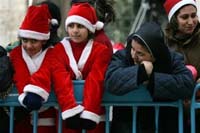Foreigners are few in Bethlehem for Christmas
Hundreds of people packed the Church of the Nativity on Monday to celebrate Christmas at Jesus' traditional birthplace, but few foreign tourists were among the worshippers, putting a damper on the holiday cheer.

Bells pealed, and decorative lights shone in Manger Square. But most of the visitors were Palestinian Christians or Israeli Arabs. Foreign visitors, who are critical to Bethlehem's economy, were largely absent, apparently deterred by recent Palestinian infighting and years of conflict with Israel.
The tensions did little to dash the spirits of foreign pilgrims who made the journey to the Holy Land.
"The experience was incredible," said Nick Parker, 24, of Goodland, Kansas, who was visiting Bethlehem for the first time. "I could feel the true spirit of Christmas here in Bethlehem."
Father Larry Sullivan, 40, a Roman Catholic prelate from Chicago, said Christmas in Bethlehem was all the more special because of the sense of unity that emerged from the conflict.
"It was a very moving experience," said Sullivan, who was also on his first visit to Bethlehem. "The spirit of Christmas is filled with great enthusiasm and great happiness, people from all walks of life coming here to share this experience."
For local residents, the atmosphere was gloomier. "Yesterday, people were afraid of the political situation," said Jane Zakariyeh of Bethlehem, referring to Palestinian infighting that has caused the deaths of 17 Palestinians in recent weeks.
Shop owners, who make most of their income during the Christmas season, complained this year was among the worst in memory.
The subdued Christmas adds to the woes of Bethlehem, which already is suffering from international sanctions imposed on the Hamas-led Palestinian government as well as Israel's separation barrier. The massive barrier encloses Bethlehem and separates it from neighboring Jerusalem.
"The economic situation is very much affecting the Christmas atmosphere here," said Mary Bader, who came to celebrate from Jerusalem.
The Israeli army said a total of 12,000 people had traveled from Jerusalem to Bethlehem for Christmas celebrations. Most of the travelers appeared to be Christians living in Israel.
The Palestinian Ministry of Tourism said 3,500 foreign pilgrims arrived in Bethlehem this year only a small fraction of the tens of thousands who would arrive before Israeli-Palestinian violence broke out in late 2000. The diminished number of visitors is a big blow to the city of 30,000.
Israel says it built the barrier to prevent Palestinian suicide bombers from reaching Israeli population centers. Palestinians view the structure, which dips into parts of the West Bank, as a land grab.
In his homily at midnight Mass in Bethlehem, Sabbah appealed to Palestinians to halt their recent "fratricidal struggles" and called for an end to Israeli-Palestinian bloodshed as well.
At the Vatican, Pope Benedict XVI voiced a similar message on Monday, taking note of the recent meeting between Israeli Prime Minister Ehud Olmert and Palestinian President Mahmoud Abbas.
"With deep apprehension I think, on this festive day, of the Middle East, marked by so many grave crises and conflicts, and I express my hope that the way will be opened to a just and lasting peace," Benedict said in his traditional "Urbi et Orbi" speech Latin for "to the city and to the world."
"I place in the hands of the divine Child of Bethlehem the indications of a resumption of dialogue between the Israelis and the Palestinians, which we have witnessed in recent days, and the hope of further encouraging developments," the pontiff added, speaking from a balcony overlooking St. Peter's Square.
This Christmas is the first under a Palestinian Authority governed by the militant Islamic group Hamas. To alleviate Christian fears ahead of the holiday, Hamas promised that it would send $50,000 (Ђ38,000) to decorate Manger Square in the center of town for the holiday. It was not clear if the money ever arrived.
With every Christmas, the Holy Land's Christian community shrinks a bit. The native Palestinian Christian population has dipped below 2 percent of the West Bank, Gaza Strip and Arab East Jerusalem, down from at least 15 percent in 1950, by some estimates. Bethlehem is now less than 20 percent Christian.
Subscribe to Pravda.Ru Telegram channel, Facebook, RSS!


